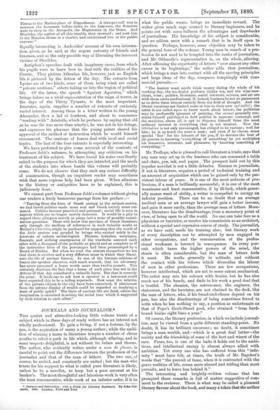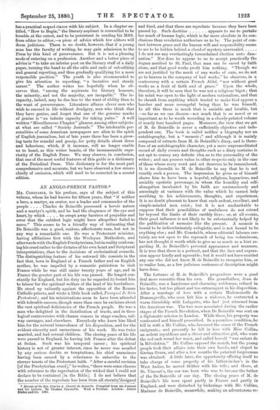JOURNALS AND JOURNALISM.*
This quaint and attractive-looking little volume treats of a subject which in these days of ready writers has an interest not wholly professional. To gain a living, if not a fortune, by the pen, is the aspiration of many a young author; while the ambi- tion of winning a name in literature tempts a number of clever youths to select a path in life which, although alluring, and in some respects delightful, is not without its briars and thorns. The author, who evidently writes under a nom de plume, is careful to point out the difference between the profession of the journalist and that of the man of letters. The two can, of course, be united, and constantly are united ; but the man who trusts for his support to what is called pure literature is likely, unless he be a novelist, to keep but a poor account at his banker's. The most thoughtful and laborious work is very often the least remunerative, while work of an inferior order, if it be • Journals and Journalism : with a Guide for Literary Beyiumre. By John Old- osetle. 1880. London : Field and Tuer. what the public wants, brings an immediate reward. The writer gives much sage counsel to literary beginners, and he points out with some fullness the advantages and drawbacks of journalism. His knowledge of his subject is considerable, and we seldom meet with a remark that is in itself open to question. Perhaps, however, some objection may be taken to the general tone of the volume. Young men in search of a pro- fession do not need to be tempted into the ranks of journalism,
and Mr. Oldcastle's representation is, on the whole, alluring. Alter affirming the superiority of letters " over almost any other
career in its beginnings," the writer adds that journalism, which brings a man into contact with all the moving principles and large ideas of the day, compares temptingly with com- mercial pursuits :- " The banker must needs think money during the whole of his working day, the tea-dealer perforce thinks tea, and the wine mer- chant, wine ; politics, literature, social interests, science, and art are with them extra-professional, if, indeed, business be not so paramount as to drive these almost entirely from the field of thought. And the liberal vocations are limited more or less to their own speciatite; the artist is not called upon to know much about letters, the politician may be profoundly ignorant of painting, the savant generally con- siders himself privileged to hold politics in supreme contempt, and the musician, above all, is apt to dispense himself from the most ordinary interest in everything that is not musical. Now the litterateur is not only encouraged, but obliged to be various ; well for him ; he is so much the more a man; and even if he choose some special line' for the labours of his pen, if he devotes the best of his powers to knowing everything of something,' be yet multiplies his resources, interests, and pleasures, by knowing something of everything.' "
Mr. Trollope, who is pleased to call literature a trade, says that any man may set up in the business who can command a table and chair, pen, ink, and paper. The prospect held out by this popular novelist is not a little delusive. Success in journalism, if not in literature, requires a period of technical training and an amount of acquisition which can be gained only by the per- sistent labour of years. It is one of the most arduous of pro- fessions, if a man is brilliantly successful ; it is one of the most
wearisome and least remunerative, if by ill-luck, which gener- ally means want of ability, a writer is compelled to occupy an inferior position. There can be no doubt that an average medical man or an average lawyer will gain a better income,
and gain it more easily, than the average man of letters. More- over, literature has the disadvantage, from a monetary point of view, of being open to all the world. No one can take fees as a physician or barrister, or receive his commission as an architect, without a special and expensive course of study. The journalist, as we have said, needs his training also; but literary work of every description can be attempted by men engaged in other occupations, and the remuneration of the profes- sional workman is lowered in consequence. In every pur- suit which taxes the higher powers of the mind, the strain is often considerable, but the man of letters feels
it most. He works generally in solitude, and without the contact with his fellows which diversifies the labour of men in other professions. There are few occupations, however intellectual, which are not to some extent mechanical. The artist may mix his colours with brains, but he has also much use of his hands, and finds in his work a good deal that is "restful. The chemist, the astronomer, the engineer, the statesman, and the barrister, are not chained to the desk, like the man of letters, who, if his bread-and-cheese depend on his pen, has also the disadvantage of being sometimes forced to write when he has nothing to say, a position as unfortunate as that of Pope's Grub-Street poet, who strained " from hard- bound brains eight lines a year."
Of course, the literary profession, in which we include journal- ism, may be viewed from a quite different standing-point. No doubt, it has its brilliant successes ; no doubt, it sometimes brings a man wealth, and—which is a great deal better—the
society and the friendship of some of the best and wisest of the race. Fame, too, is one of the baits it holds out to the ambi-
tious, and intellectual energy is almost always allied with ambition. Yet every one who has suffered from this "infir- mity " must have felt, at times, the truth of Mr. Bagehot's words that "the pursuit of fame, when it is contrasted with the grave realities of life, seems more absurd and trifling than most pursuits, and to leave less behind it."
The interesting and brightly-written volume that has prompted these remarks is full of matter suggestive of com- ment to the reviewer. There is what may be called a pleasant literary flavour about the book, and many a token that the author has a practical aequairtance with his subject. In a chapter en- titled, " How to Begin," the literary aspirant is counselled to be humble at the outset, and to be persistent in sending his MSS. from editor to editor,—a piece of advice which few editors will deem judicious. There is no doubt, however, that if a young man has the faculty of writing, he may gain admission to the Press by this kind of perseverance. But it is not a pleasing mode of entering on a profession. Another and a better piece of advice is " to take an inferior post on the literary staff of a daily paper, turning the hand to all the odds and ends of sub-editing and general reporting, and thus gradually qualifying for a more responsible position." The youth is also recommended to give his attention to reporting, " a lucrative and steady career." The author writes too hopefully when he ob- serves that, " among the aspirants for literary honours, the minority, and not the majority, are incapable." The in- capacity, indeed, may be due less to the want of ability than to the want of perseverance. Literature allures clever men who -wish to succeed in life without drudgery, men who think that they have genius, and forget that one of the genuine marks of genius is " an infinite capacity for taking pains." A well written "Miscellaneous Chapter" glances, among other subjects> at what are called " Society Journals." The intolerable per- sonalities of some American newspapers are alien to the spirit of English journalism, but of late years there has been a grow- ing taste for scandal and gossip, for petty details about dress and behaviour, which, if it increase, will no longer enable us to boast, as this writer boasts, of the immeasurable supe- riority of the English Press. We may observe, in conclusion, that one of the most useful features of this guide is a dictionary of the Periodical Press. This dictionary is for the most part comprehensive and accurate, but we have observed a few errors, chiefly of omission, which will need to be corrected in a second edition.



































 Previous page
Previous page